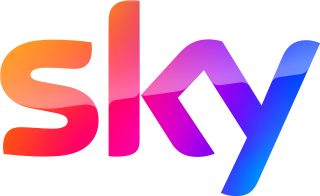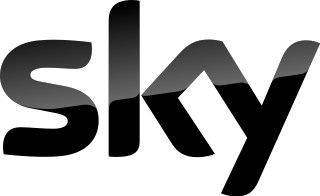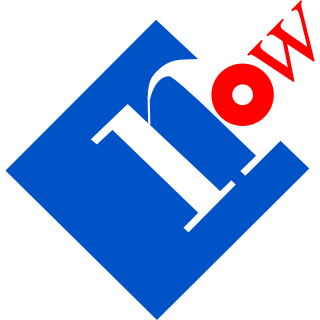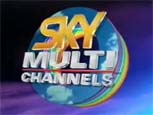Related Research Articles

ITV Digital was a British digital terrestrial television broadcaster which launched a pay-TV service on the world's first digital terrestrial television network. Its main shareholders were Carlton Communications plc and Granada plc, owners of two franchises of the ITV network. Starting as ONdigital in 1998, the service was rebranded as ITV Digital in July 2001.

Sky Group Limited is a British media and telecommunications conglomerate, which is a division of Comcast, and headquartered in London. It has operations in the United Kingdom, Ireland, Germany, Austria, Switzerland and Italy. Sky is Europe's largest media company and pay-TV broadcaster by revenue, with 23 million subscribers and more than 31,000 employees as of 2019. The company is primarily involved in satellite television, producing and broadcasting. The current CEO is Dana Strong.
Regular television broadcasts in the United Kingdom started in 1936 as a public service which was free of advertising, which followed the first demonstration of a transmitted moving image in 1926. Currently, the United Kingdom has a collection of free-to-air, free-to-view and subscription services over a variety of distribution media, through which there are over 480 channels for consumers as well as on-demand content. There are six main channel owners who are responsible for most material viewed.

Sky UK Limited is a British broadcaster and telecommunications company that provides television and broadband Internet services, fixed line and mobile telephone services to consumers and businesses in the United Kingdom. It is a subsidiary of Sky Group and from 2018 onwards, part of Comcast. It is the UK's largest pay-TV broadcaster with 12.7 million customers as of the end of 2019 for its digital satellite TV platform. Sky's flagship products are Sky Q and the internet-based Sky Glass, and its flagship channels are Sky Showcase, Sky Sports and Sky Atlantic.

ITV Digital Channels Limited is a wholly owned subsidiary of British broadcaster ITV plc. It manages all of the company's television channels with the exception of ITV1, which is part of the entire network.
VideoGuard, produced by NDS, is a digital encryption system for use with conditional access television broadcasting. It is used on digital satellite television systems - some of which are operated by News Corporation, which owned about half (49%) of NDS until its sale to Cisco in 2012. Since 2018 VideoGuard is improved and maintained by Synamedia. Its two most widely used implementations are Sky in the United Kingdom and Ireland and DirecTV in the United States, the former of which launched the digital version of the system in 1998.
Astra 1A was the first satellite launched and operated by SES, launched in December 1988. During its early days, it was often referred to as the Astra Satellite, as SES only operated one satellite originally. The satellite provided television coverage to Western Europe from 1989 to 2004. Astra 1A was retired and became derelict in December 2004.
Analogue television in the United Kingdom includes terrestrial, satellite and cable services that were broadcast using analogue television signals. Following the termination of Virgin Media's analogue cable television service in Milton Keynes in November 2013, all television in the United Kingdom is broadcast in digital only.
Sky Arts is a British free-to-air television channel offering 24 hours a day of programmes dedicated to highbrow arts, including theatrical performances, films, documentaries and music. The channel is available in the United Kingdom through Freeview, Freesat, BT TV, Sky, Virgin Media, and TalkTalk TV and in the Republic of Ireland via Sky Ireland, Virgin Media Ireland, Vodafone Ireland and eir, included in most basic subscription packs, but started life as a premium service requiring an additional payment on top of the monthly Sky subscription. The channel launched on Freeview and Freesat as a free-to-air service in September 2020.
Sky Television plc was a public limited company which operated a nine-channel satellite television service, launched by Rupert Murdoch's News International on 5 February 1989. Sky Television and its rival British Satellite Broadcasting suffered large financial losses, and merged on 2 November 1990 to form British Sky Broadcasting. A programming merger took effect on 1 December 1990.

Sky Deutschland GmbH, branded as Sky, is a German media company that operates a direct broadcast satellite Pay TV platform in Germany, Austria and Switzerland. It provides a collection of basic and premium digital subscription television channels of different categories via satellite and cable television.

Now was a British television channel transmitted as part of the British Satellite Broadcasting service during 1990.

Sky Multichannels was a package of analogue television services offered by BSkyB on the Astra satellites at 19.2° east from 1 September 1993 to 27 September 2001, which started off with 15 channels before expanding to over 40.
National Geographic Channel is a Nordic free-to-air television channel broadcasting documentaries and related programmes to the Nordic countries.

CTV was an analogue pay television package, available in Scandinavia. It was mostly using Norwegian satellites such as Thor 1 and Intelsat 707 to broadcast basic channels to Scandinavian homes, using the D2-MAC transmission system. CTV was operated by Telenor, who in 1997 joined forces with Multichoice to launch the Canal Digital platform. Most of the CTV channels were closed down in September 2001.
Satellite television varies in the different regions around the world.
Home Video Channel (HVC) was a British cable television service devoted to broadcast low-budget movies (such as horror, action, adventure, science fiction and erotica) from 8.00pm to midnight, and the owners also operated The Adult Channel which started on 31 January 1992.
This is a timeline of the history of Sky Television.
This is a timeline of the history of Sky One and its spin-off channels.
References
- ↑ "Tilspisset kamp om TV-distribusjon". Digi.no. March 7, 1997.
- 1 2 "Telenor i SKYene". IT-avisen. March 10, 1997.
- ↑ "Granada Joint Venture With BSkyB". The Media Leader. 1995-12-13. Retrieved 2023-03-09.
- ↑ "Sky's deal with Granada for the Rover's golden days". The Independent . 1995-12-14. Retrieved 2023-03-09.
- ↑ "GRANADA SKY BROADCASTING TO EXPAND". Telecompaper. 1997-04-21. Retrieved 2023-03-09.
- ↑ "MediaScan/Sweden Calling DXers 2279 Part 1". September 15, 1997.
- ↑ "SATCO DX – Updates 980330-980405". www.sat-net.com.
- ↑ "1st for news: What Satellite TV magazine". Archived from the original on 1999-02-10.